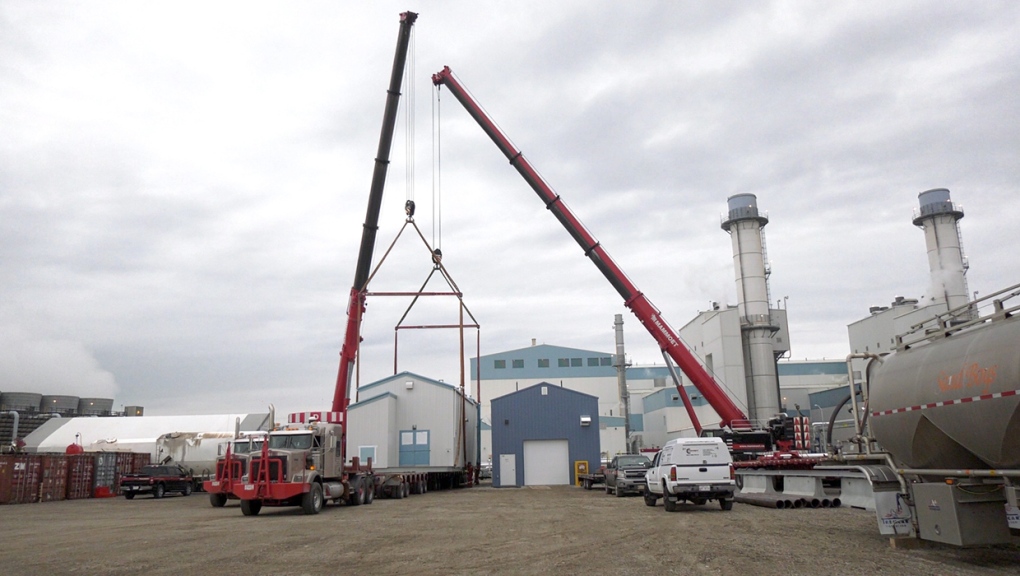Alberta prioritizes oil sands' carbon storage hub, energy minister says
 A giant carbon capture unit being lifted into place at the Shepard Energy Centre east of Calgary
A giant carbon capture unit being lifted into place at the Shepard Energy Centre east of Calgary
The government of Alberta, Canada's main oil-producing province, plans to move forward "very, very quickly" on its next carbon sequestration hub in the Cold Lake region that will serve oil sands producers, Energy Minister Sonya Savage told Reuters.
Alberta is currently accepting requests for proposals to operate an underground carbon storage hub serving the Alberta Industrial Heartland (AIH) zone near Edmonton. The process to select an operator for another hub near Cold Lake will come "on the heels" of that, Savage said in an interview late on Thursday.
"We are going to need to move on Cold Lake very, very quickly after Heartland," Savage said. "It's a hub that will give certainty to oil sands and heavy oil production."
The government is keen to move forward this year on several carbon storage hubs, where an operator will sequester both their own and third-party emissions, so industries in different areas of the provinces are not at a competitive disadvantage.
Carbon capture, utilization and storage (CCUS) is expected to be a key part of global efforts to contain emissions from fossil fuel production. It involves capturing carbon produced from heavy industrial processes like upgrading oil sands bitumen and storing it permanently underground.
"CCUS is probably my number one priority file at the moment," Savage said.
Fatih Birol, the head of the International Energy Agency, said on Thursday his organization considered CCUS to be one of the three most critical decarbonization technologies.
Alberta is aiming to aggressively expand its CCUS industry to help cut emissions and safeguard the future of its energy industry as the world aims for net-zero emissions by 2050. Savage's comments show how that plan is taking shape.
There has also been "tremendous interest" in a hub in the Grand Prairie region, where a lot of natural gas processing takes place, Savage added.
Alberta announced last year it would hold a competitive process for how it allocates underground pore space after a number of companies including Royal Dutch Shell, TC Energy and an alliance of oil sands producers proposed CCS projects.
Savage said the province received nearly 50 expressions of interest in leasing pore space rights from industries ranging from energy to petrochemicals to fertilizer production.
The government asked for formal proposals for the AIH first because they received the most interest in that area, and a number of proposals competing for the exact same underground pore space, Savage said.
Alberta plans to select the AIH sequestration hub operators by the end of March, and Savage said projects that will be up and running quickly are more likely to be successful.
"We have suggested to industry that time is of the essence, we'll be weighted more heavily towards project proposals that will be in service at an earlier date," she said.
Savage said all projects will have to go through a regulatory process, and would likely take a couple of years to start operating.
Reporting by Nia Williams Editing by Marguerita Choy
CTVNews.ca Top Stories

Grandparents killed in wrong-way crash on Hwy. 401 identified
A 60-year-old man and a 55-year-old woman killed in a wrong-way crash on Highway 401 earlier this week have been identified by the Consulate General of India in Toronto.
Police arrest 3 Indian nationals in killing of B.C. Sikh activist Hardeep Singh Nijjar
Three people have been arrested and charged in the killing of B.C. Sikh activist Hardeep Singh Nijjar – as authorities continue investigating potential connections to the Indian government.
TD worst-case scenario more likely after drug money laundering allegations: analyst
TD Bank Group could be hit with more severe penalties than previously expected, says a banking analyst after a report that the investigation it faces in the U.S. is tied to laundering illicit fentanyl profits.
Human remains found in rural Sask. possibly a decade old, RCMP say
RCMP say human remains found in a rural area in central Saskatchewan may have been there for a decade or more.
2 charged after police find 'concerning and diverse' explosives at Manitoba home
Winnipeg police say they have arrested two people in their 20s after a large amount of explosives were found in a home outside of Winnipeg, Man.
Canadian doctor concerned new weight-loss drug Wegovy may be used inappropriately
As Wegovy becomes available to Canadians starting Monday, a medical expert is cautioning patients wanting to use the drug to lose weight that no medication is a ''magic bullet,' and the new medication is meant particularly for people who meet certain criteria related to obesity and weight.
Spain abolishes national bullfighting award in cultural shift
Spain scrapped an annual bullfighting award on Friday, prompting a rebuke from conservatives over a backlash against a centuries-old tradition they see as an art form but which has run into growing concern for animal welfare.
Drew Carey is never quitting 'The Price Is Right'
Drew Carey took over as host of 'The Price Is Right' and hopes he’s there for life. 'I'm not going anywhere,' he told 'Entertainment Tonight' of the job he took over from longtime host Bob Barker in 2007.
Police officer hit by driver of fleeing vehicle in Toronto
York Regional Police say they are continuing to search for a suspect in an auto theft investigation who was captured on video running over a police officer in Toronto last month.































